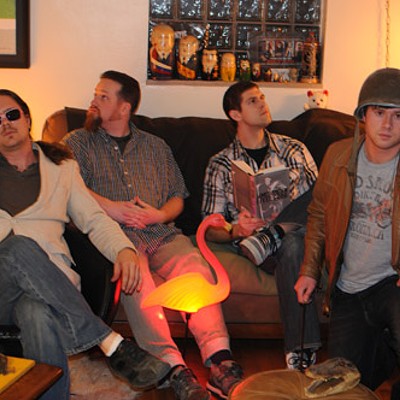Monday, June 20, 2011
Police accountability: those who don't learn from history ...
Last Wednesday's city council meeting had a little bit of everything: a citizen speaking on behalf of incandescent light bulbs ... Doug Shields urging that former Gov. Ed Rendell might be brought before council to discuss the Cvic Arena ... even a blogger wearing a suit.
But some aspects of the meeting sounded a little familiar, especially the parts concerning city councilor Ricky Burgess' legislation to monitor potential police misconduct.
Citizens came to testify about the need for stricter monitoring of police. Among them was Joy Sabl, a city resident who is active in progressive causes -- and who brought an anecdote about her own experience with police.
"As several council members may know," she said, "my husband and I were pulled over ... a couple years ago by the officer who has since been profiled in City Paper for being the baddest of the bad apples."
That's a reference to Lauren Daley's March story on Garrett Brown, who has been the subject of multiple complaints ... though the "baddest of bad apples" language is Sabl's characterization, not ours. In any case, Sabl told council that during an encounter on the South Side, the officer
was upset that we were bicycling on the street. He apparently felt we should be bicycling on the sidewalk. And ... when he yelled at us from behind to get off the street on Carson Street, he apparently thought we could figure out that he was a police officer on a motorcycle, as opposed to assuming that he was one of the many drunks on Carson Street on a weekend night who yell at bicyclists to get off the street.
He wanted to arrest us for evading arrest. He wanted to arrest the other guy -- the other cyclist -- who stopped to see if everybody was OK. He threatened to bring him in and strip-search him. He threatened to bring us in and strip-search us. And the fact he could reasonably make these threats, and that it was something he could have done, that he could say "I will physically strip search you," while looking at me with a nasty look on his face -- that’s scary. OK?
The fact that he could look at the other cyclist and say "I'm going to arrest you for impeding an investigation if you don't start moving again; I’m gonna have you up against the wall in a minute." That’s scary.
Later in that meeting, meanwhile, Doug Shields cited a 1990s-era city controller's audit on police discipline -- an audit also discussed in our story on Brown.
That audit, compiled by then-Controller Tom Flaherty, found that a disproportionately small number of officers accounted for a disproportionately large number of complaints. Shields noted that according to the audit, while most officers had either zero or one citizen complaint lodged against them, a small percentage of police were named in multiple complaints. "One officer had 34 complaints," Shields said. "That's the officer that I'm concerned about."
"This audit is instructive," Shields said. "It is a distant mirror for the council to look into" and understand the current situation. Shields says that if a statistical breakdown was carried out on the current police force, he would "bet the house" that it would reveal a similar distribution -- with many complaints naming a small fraction of the force.
"As it was then, it is now," Shields says.
Burgess' legislation may be the means for finding out whether that's true. Last year, the bill started out as a requirement for statistics on policing: the number of officers on duty, the number named in citizen complaints or criminal charges, information on arrests ... all broken down by race and gender where appropriate. The bill has since been expanded: It now also seeks extensive information on the use of strip searches, car chases and other police procedure, for example.
The bill should come up for discussion this week: The city law department had reviewed an earlier version of the law, but solicitor Dan Regan told council he had not seen its expanded provisions and couldn't discuss them.
But in the best Pittsburgh City Council tradition, that didn't forestall a lengthy discussion of the matter. Shields, for one, pointed out another 1990s-era dynamic that should also be familiar to readers of this blog: That discipline problems were worsened by an exodus of officers taking advantage of an early-retirement offer in the early-to-mid 1990s. "We had huge turnover," Shields warned. And because of concerns about the city's pension fund, he predicted, "We're going to see the results of [a similar exodus] now."
Tags: Slag Heap










